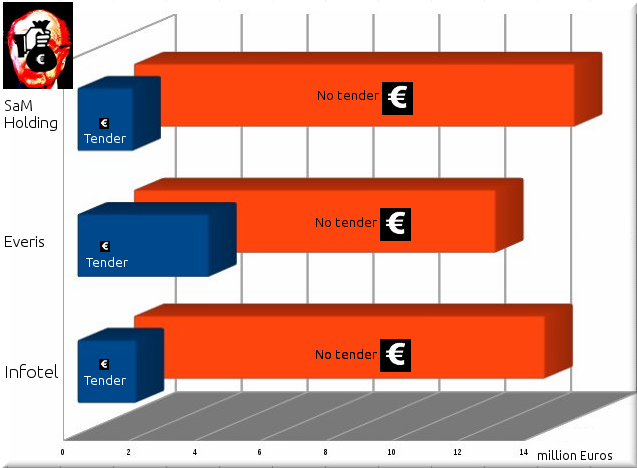

THE European Patent Office ought to be widely viewed as Europe's most scandalous 'public' (corporate) institution. As we noted here before, the EPO's French CIO from “Informatique CDC” was wasting heaps of money on "IT" (not far from a hundred million Euros). Combine this kind of budget with lack of oversight and you might expect something like the Bygmalion affair, with massive contracts given to French companies (adjacent to the CIO's previous employer) such as Infotel. Alarms were already raised about this, judging by the following explanation based on which we produced the chart above:
One thing that is noteworthy is that there are more direct placements (79 in total) than there are awards after competitive bids (42 in total) and that the average value of the direct placements are higher than those of the competitive bids. The big winners are IT consultants, among which InfotelConseil S.A. (Neuilly, near Paris), SaM Holding GmbH (Gilching, near Starnberg) and Everis Spain S.L. (in Brussels). For Infotel the total value of the listed contracts is slightly over 14 million Euro. The total value of the 5 awards after competitive bids is about 1.8 million, i.e. almost 340 thousand Euro per contract. The total value of the 11 (!) direct placements is almost 12.5 million, with an average value of about 1.1 million per contract. We see a similar pattern with Everis Spain, with a total value of the listed contracts of over 15 million Euro. The 8 contracts after competitive bids have an average value of 574 thousand Euros. The 14 (!) direct placements are worth almost 11 million Euros, i.e. 770 million Euro / contract. SaM Holding won 2 competitive bids leading to contracts with a value of 1.7 million, i.e. 850 thousand per contract. Its 9 direct placements (among which 3 of over 2 million) amounted to 13.4 million Euro, i.e. an average of almost 1.5 million Euro per contract.
Direct placements by the EPO are highly problematic because of their lack of transparency and because these contracts are not open to any effective form of control or challenge. Already, potential competitors cannot challenge such placement for the simple reason that they are not informed of their existence. They also do not know the rules that apply. The only possible controls are from within the Organisation, i.e. by the Board of Auditors or by the staff representation. The EPO’s Board of Auditors, appointed by the EPO’s Administrative Council, is notoriously inefficient in finding irregularities. In the rare cases where it does find something wrong, the Office mostly ignores their comments. Given the lack of alternative controls, the staff committee challenged a direct placement (later also flagged as irregular by the Auditors! See page 159 of CA/20/09) at ILOAT. In its Judgment 3343 the Tribunal held the complaint irreceivable because the alleged violation of the rules did not have “a direct and immediate bearing on the employment status or rights of employees.” This leaves the EPO’s about multi-million Euros procurement budget essentially without any control.